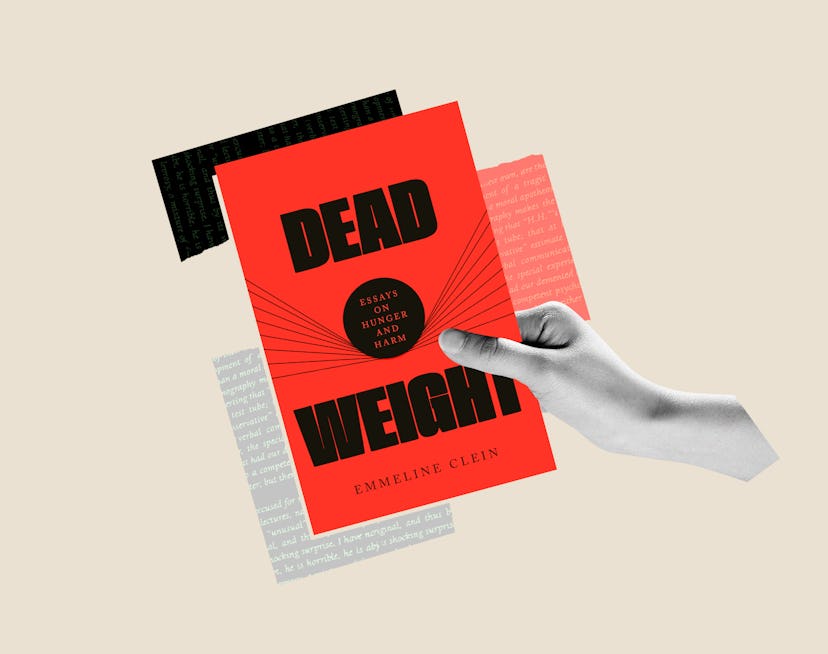Bustle Book Club
Emmeline Clein’s Debut Book Takes A Critical Look At Y2K Pop Culture
In Dead Weight, she unpacks how disordered eating was the norm in many of the mainstream hits.

Author Emmeline Clein often finds herself consumed by characters and pop-culture figures long after their popularity has peaked. The O.C.’s brooding and beautiful Marissa Cooper. A 20-something, spun-out Lindsay Lohan. Queen bee Blair Waldorf from Gossip Girl.
“I was doing research on female hysteria when I discovered that there were a lot of disordered eating symptoms present in the fictional characters, celebrities, and women writers I was obsessed with,” the debut author, 29, tells Bustle. “I realized that disordered eating was the thing linking all these figures.”
Disordered eating, in turn, became the connective tissue of Clein’s incisive, urgent essay collection, Dead Weight: Essays on Hunger and Harm, in which she examines the effects of the condition on herself, early aughts tabloid stars, and even French philosophers such as Simone Weil. “Eating disorders touch ‘highbrow literature’ as much as what is considered ‘lowbrow literature.’ They touch our mainstream film and television industry just as much as every single aspect of our health care system,” says Clein, who graduated from Columbia’s MFA program in 2022. To capture this enormous scope, she incorporated everything from “bits that are highly memoiristic, some that read like an AIM chat transcript, to epidemiological data, to writing about Gossip Girl.”
While the collection includes Clein’s reflections on the women who fueled her fascination, she urges readers think beyond individual figures. “I never want to demonize somebody that fits this impossible beauty ideal, because she probably just read the same magazines that I did 10 years earlier,” Clein says. It’s the systems she’d rather demonize: “the companies that are seeding that beauty ideal into our media who are, themselves, funded by the ads of the weight loss companies.”
Below, she reflects on The Simple Life, Marlboro Golds, and Renata Adler.
On The Out-Of-Print Book She Can’t Put Down:
Eliza Callahan’s book The Hearing Test comes out next week and it’s just a completely engrossing, surreal recounting of the narrator’s experience with a brief period of sudden deafness. I’m also reading a book called The Second Suspect, which is tragically out of print. It was written by Heather Lewis, who was a fabulous lesbian novelist. The book is about a sadomasochistic triad between a young, vulnerable sex worker, an incredibly wealthy man, and his wife. All of her writing is just some of the most immediate, volatile depictions of sexual trauma I’ve ever read.
On Bringing Levity To Serious Topics:
If I feel super stuck and questioning if I’m being “intellectually serious enough,” I’ll read a book that is absolutely going off in terms of turns of phrase. Renata Adler’s Speedboat is one I go back to, or Pitch Dark. Really anything by her [helps] when I’m having a writer’s block moment, because she reminds me that you can be engaging with politics, interpersonal relationships, and gossip all simultaneously — and you can be doing it in a way that is genuinely fun while still making a serious point.
On Watching The Simple Life As Research:
I watch a lot of old reality TV [to procrastinate], like an episode of The Simple Life or of America’s Next Top Model. I’ve spent a lot of time thinking about Nicole Richie and the cruelty she was subjected to by the media during The Simple Life for looking ever so slightly different than Paris Hilton. In the book I wrote about how people went from demanding that she lose weight in the cruelest terms, and then as soon as she did, she was on the cover of Vanity Fair being accused of anorexia.
On Her Post-Writing Vice:
I’ll have a Marlboro Gold cigarette, depending on how well [the writing] went. I need to be doing it less, but it’s such a good punctuation mark for the day.
This interview has been edited and condensed for clarity.